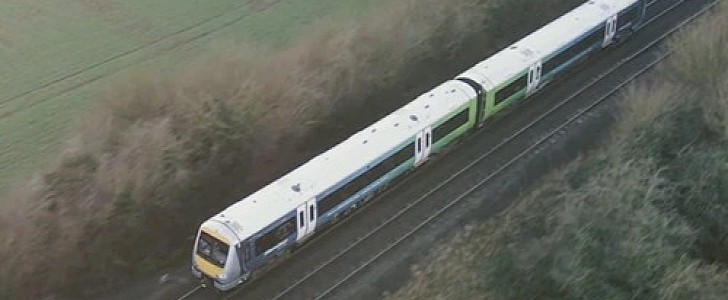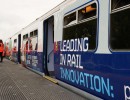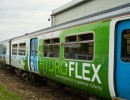Decarbonizing UK’s entire rail network sounds like a difficult task, but a giant player in the industry is committed to achieving this goal, with help from Rolls-Royce, which is also on a path towards carbon-neutral operations. After the recent launch of a pioneering hybrid passenger train, the two have teamed up for the advanced hybridization of the rail system.
The UK wants all diesel trains, both passenger and freight, to stop operating by 2040, as they are being replaced with clean energy alternatives, including hybrid-electric, hydrogen fuel cells, and sustainable fuels. Even though the country’s rail system is responsible for only 1% of the total greenhouse gas emissions, every ton of CO2 counts, so the transition to a sustainable rail system could have a significant positive impact.
With approximately 4,000 vehicles in operation and on order, Porterbrook is one of the largest rail developers in the country, owning almost a quarter of the entire passenger rail fleet. But it’s also committed to a future green rail system and has taken major steps in that direction. It developed HydroFLEX, which is not only the first hydrogen-powered train to operate on the UK’s mainline network, but also the world’s first tri-mode train, featuring electric, battery, and hydrogen power.
Together with Rolls-Royce, Porterbrook also developed the HybridFLEX, a hybrid-powered passenger train that recently entered into service with Chiltern Railways, operating between London Marylebone and Aylesbury. A converted Class 168 DMU, it’s equipped with two mtu Hybrid PowerPacks, and claims to be able to cut CO2 emissions by 25%.
According to Rolls-Royce, under this new agreement, the two will be exploring the use of synthetic and net-zero fuels in fuel cell and internal combustion engines.
Through its Power Systems branch, the company is developing a new generation of its acclaimed diesel engines, which will be compatible with sustainable fuels, and it intends to make the mtu Series 4000 engines (also used in locomotives) able to run entirely on hydrogen as well, starting next year.
With approximately 4,000 vehicles in operation and on order, Porterbrook is one of the largest rail developers in the country, owning almost a quarter of the entire passenger rail fleet. But it’s also committed to a future green rail system and has taken major steps in that direction. It developed HydroFLEX, which is not only the first hydrogen-powered train to operate on the UK’s mainline network, but also the world’s first tri-mode train, featuring electric, battery, and hydrogen power.
Together with Rolls-Royce, Porterbrook also developed the HybridFLEX, a hybrid-powered passenger train that recently entered into service with Chiltern Railways, operating between London Marylebone and Aylesbury. A converted Class 168 DMU, it’s equipped with two mtu Hybrid PowerPacks, and claims to be able to cut CO2 emissions by 25%.
According to Rolls-Royce, under this new agreement, the two will be exploring the use of synthetic and net-zero fuels in fuel cell and internal combustion engines.
Through its Power Systems branch, the company is developing a new generation of its acclaimed diesel engines, which will be compatible with sustainable fuels, and it intends to make the mtu Series 4000 engines (also used in locomotives) able to run entirely on hydrogen as well, starting next year.






